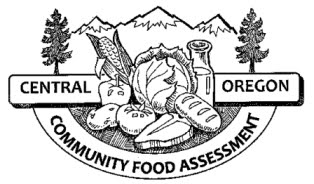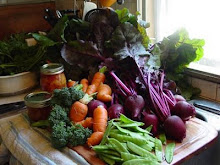
To the Deschutes County Commissioners and Planners -
My name is Gigi Meyer and I own Windflower Farm, a 10-acre, mixed-use farm in Alfalfa. I understand there is some discussion lately about re-defining EFU zones to allow for destination resort development. I believe this would be a grave mistake and disservice to our community on so many levels, not the least of which, is that we are currently saturated with resorts that have large vacancy rates. Beyond the folly of another short-sighted land grab for the benefit of a few property owners; the value of farmland, and potential food-growing opportunities for our population, cannot be over-estimated. Oregon has a history of strong protections for our open space – it is why we are such a coveted tourist destination in the first place. To diminish the beauty and environmental health of our surroundings is to throw the baby out with the bathwater.
It has come to my attention that some property owners are claiming that their irrigated acreage is too “marginal” for farming. Central Oregon's generous water supply makes it an even more ideal venue for agriculture than other areas that may start off with more fertile soil. As you may know, the Klamath Basin and many prime agricultural areas in California and around the world are suffering water conflicts and shortages that will only increase in the future. Soil can be amended to grow food. My farm started off as a patch of weeds and rocks. I added compost and organic fertilizer and it bloomed. So the soil fertility issue is a canard. But without water, plants don't grow. So as farmland decreases around the world, those areas with ample irrigation will be the lucky ones and will be able to sustain their populations with local farms. Farmland (ie. food) is necessary to human survival. We should be looking for ways to preserve it and improve it, not sell it to the highest bidder for more luxury resorts or housing developments.
As a farmer, I would like to see some small changes in the EFU definitions that would allow me to farm more successfully. To my mind, this should be the focus of any changes – to preserve, enhance, and encourage farming.
Some background:
I grow vegetables, herbs, fruit and flowers. I have a flock of 30 laying hens and sell both produce and eggs through a CSA (Community Supported Agriculture) membership program, feeding roughly 40 families in our community throughout the growing season. Additionally, I team up with a local goat dairy to offer my members an assortment of farmstead cheeses. I sell my extra produce to a local natural food store. Two broodmares and their progeny comprise my small sport horse breeding operation and two young dairy goats currently provide organic weed control and will soon be bred to milk.
Following a bio-dynamic model, I compost manure from my animals along with garden debris to provide fertilizer for my pastures, orchards, and produce plots. I use greenhouses, row cover, rock walls and windbreaks to extend the growing season and practice crop rotation, the planting of cover crops and beneficial insect havens to enhance our farm ecology. Although not certified, I farm according to organic practices. Many people did not believe that gourmet produce could grow in our area. Historically, a farm in Central Oregon meant a ranch of hundreds or thousands of acres of beef cattle, sheep, or hay.
My vision of my farm from the start was that it would be a model for sustainable, farm-to-table agriculture in Central Oregon. My farm, along with 4 other CSA farms in the area are living proof that our region can grow a tremendous variety of the highest quality produce for human consumption. I’ve found tremendous enthusiasm in our community for my farming adventure and each year have a waiting list for my CSA. Oregon State University Extension as well as the culinary school at Central Oregon Community College regularly schedule class visits to my farm and the excitement of the students is truly inspiring. We receive applicants for interns from around the world who are eager to come spend time working on and learning about the farm in the hope of one day having a productive farm of their own.
Societal trends indicate increased human desire for healthy food and a healthy planet. Small, diverse food farms that serve their local communities further both of these goals. Yet there remain substantial hurdles to overcome to insure that environmentally responsible farming can proliferate and be financially sustainable for the farmer. Below I’ve listed both the positive values of sustainable farming as I see them as well as the hurdles I’ve discovered in making local food farming in our area economically viable.
The value of small scale, sustainable food production
- To Provide healthy food to the local community.
- To Provide food security. It has been estimated that, in an emergency, due to our dependence on trucked-in food, our community has 4 days worth of sustenance in the grocery stores. More local food farms means more food security.
- Incurs Small Carbon Footprint –we depend on manual labor with minimal use of tractors and fossil fuels, have minimal transport from farm to consumer, we recycle packaging and cycle compost back to the soil, minimizing the need for chemical fertilizers.
- Keeps rural land in agricultural production
- Keeps rural land scenic – tourist attraction A popular road-biking route from Bend comes by my farm regularly.
- Contributes to the local economy and also provides economic diversity in a system that has been lop-sided regionally towards large-scale hay and livestock ranching
- Protects the land through bio-diversity and sustainable/organic practices – improving the soil, protecting air and water, and providing a haven for bees and other beneficial insects which is a benefit to all surrounding farms, small and large.
- Engages in fair labor practices. Conventional, large-scale agriculture has a history of sub-par pay for workers and a high risk of involuntary exposure to toxic chemicals. Truly sustainable farms provide healthy jobs at a living wage.
The challenges – Making Ends Meet; How the County can Help
1. Sustainable farming is labor intensive. Allow for separate (to-scale) farm-help dwelling on small acreage. My labor costs are my primary operating expense. This is true, not just for me but for similar farms in the area. There are programs in place that match eager young people willing to work and learn the trade with small farm CSAs. Yet under the current zoning restrictions, small farms in Deschutes County with EFU (Exclusive Farm Use) status are prohibited from providing board to these willing workers in a separate shelter on the farm. The requirement is that a farm be 40 acres or more to qualify for a dwelling exemption. The restriction should be based on commercial farm activity and not on acreage. The law is out-dated and doesn’t reflect the changing tide in agriculture toward small, sustainable food production.
In keeping with the purpose of EFU zoning, which is designed to protect and preserve agricultural land and in order to reflect the changing nature of agriculture, I would propose allowing limited accessory housing for farm labor to help small-scale, sustainable farms to be productive and profitable.
2. Current food prices don’t reflect the true costs of sustainable food production and farmers must find alternate income. Allow for low-key agri-tourism. Small farmers must be creative in searching for alternate sources of income. A 2000 study out of Cornell University reported that farmers who incorporated agri-tourism into their farm activity could be 40% more profitable than those that did not.
A local biking club is interested in making my farm a lunch stop. For a fee, I could provide tables in a pastoral setting for 5 to 6 bicyclists and offer tea and salad. Several chefs in town have approached me expressing interest in having Farm to Table
dinners here on the farm. These are increasingly popular events in farms near Portland and Seattle –where chefs create dinners on-farm for a limited group of invitees, using produce harvested directly from the farm. Currently this would be considered a non-farm activity and would not be allowed.
Additionally, I have a loft space above our horse barn that could be easily converted to comply with residential codes. One couple or small family at a time could rent the space for a few days to learn about sustainable agriculture. This is a growing trend in Europe and around the U.S. and has been the difference, in many cases, in allowing farmers to stay on their farms and survive financially. This broader view of agricultural purpose also benefits the local economy and the larger tourism industry in our area - by providing more options for visitors and by showcasing the diverse beauty of our landscape. I would like to emphasize that I am not asking to take my viable farming land out of production to build a dwelling. In spite of the added excavation expense, I purposely chose to situate my barn on the narrow strip of lava that crosses our property and not on irrigable land, in order to maximize the productivity of my farm. The loft space that could house a couple of tourists, is contained within this existing structure.
CONCLUSION: The benefits to society and to the planet of small-scale, sustainable agriculture are myriad. Yet, without addressing the hurdles, many farms like mine will fail. Legislation to allow on-site help-dwelling and additional farm-related income through agri-tourism could allow farms like mine to thrive. It would be wonderful if we could send a message to the idealistic young apprentice farmers I’ve met, that along with being a noble pursuit and a true asset to our community, our economy, and our environment - sustainable farming is also a viable, healthy way to make a living.
There is growing public attention being paid to human and planetary health that is fueling the burgeoning of sustainable agriculture. I’m amazed at how quickly local food programs have proliferated across the country and have begun to take root here in Deschutes County. I would love to tell the 40 potential clients on my CSA waiting list, whom I’ll have to turn away, that there are new farms coming to them and that local food will soon be available to all who want it. Your future efforts could make the difference in providing small, sustainable farms like mine the support they so desperately need. Thank you very much for your time and attention.
Sincerely,
Gigi Meyer





